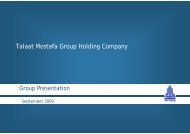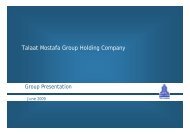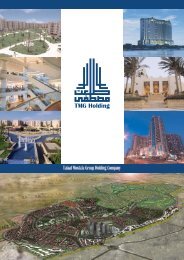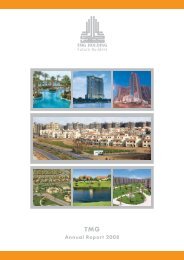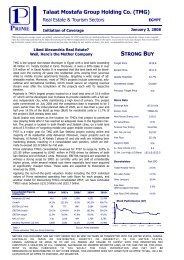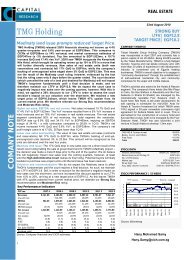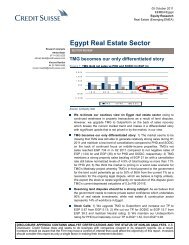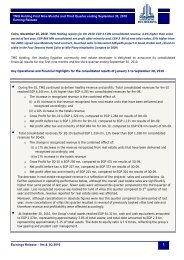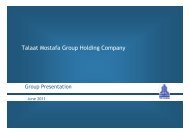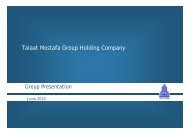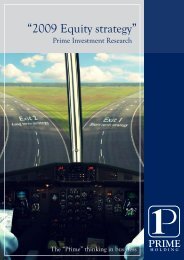Deutsche Bank - Egypt Real Estate - (6th of July 2010) - SODIC
Deutsche Bank - Egypt Real Estate - (6th of July 2010) - SODIC
Deutsche Bank - Egypt Real Estate - (6th of July 2010) - SODIC
You also want an ePaper? Increase the reach of your titles
YUMPU automatically turns print PDFs into web optimized ePapers that Google loves.
5 <strong>July</strong> <strong>2010</strong> <strong>Real</strong> <strong>Estate</strong>, Construction and Building Materials <strong>Egypt</strong> <strong>Real</strong> <strong>Estate</strong>• <strong>SODIC</strong> (Buy): In our opinion, <strong>SODIC</strong> is a company led by strong management and istransforming from a mono project residential developer to a builder <strong>of</strong> downtowns inWest/East Cairo with a focus on undersupplied retail and commercial space. While weacknowledge that the company operates in the high-end segment where we expectlower growth compared to the mid-income segment, it <strong>of</strong>fers differentiated products interms <strong>of</strong> quality and concept. Non-residential should account for 57% <strong>of</strong> planned BUA,while the company intends to retain 30% <strong>of</strong> BUA as investment property. We like thestrategy, as the concept is unique but lucrative due to high yields in this space.Additionally, it has a low risk pr<strong>of</strong>ile due to its strong balance sheet (net cash EGP1.2bn-40% <strong>of</strong> market cap.), flexible development model leading to minimum outstandingcommitment at any point in time and low outstanding land liability (EGP165m over 7years). Admittedly, <strong>SODIC</strong> needs to raise EGP1bn (DBe) between 2011-2012E to buildthe investment portfolio, but in the case <strong>of</strong> funds not being raised, the financial pr<strong>of</strong>ile <strong>of</strong><strong>SODIC</strong> would not weaken materially as the projects are still in the drawing board stage.<strong>SODIC</strong>’s intrinsic value comes from its small but prime landbank entirely in Cairo. WestCairo landbank is located adjacent to Smart Village, a successful business park, whereasthe East Cairo landbank is located near the fast-growing Kattameya/New Cairo area. Thecurrent price values landbank at a slight (8%) premium to historical cost and implies nonew launches, which is unjustified following recent strong sales momentum (backloggrew from EGP1.9bn in 2008 to 2.7bn in 2009 and then to EGP3.4bn in Q1 <strong>2010</strong>). Weinitiate with a Buy and a TP <strong>of</strong> EGP112.• PHD (Hold): We see PHD as the most leveraged play on <strong>Egypt</strong>ian market. The companyholds the most diversified land bank and exposure to first and second homes. While wedo not see a rally in property prices in <strong>Egypt</strong> to play PHD, performance in second homessales remains difficult to predict. The company maintains a healthy backlog (EGP10bn)supporting its top line for the next 4+ years with on average >60% <strong>of</strong> launched projectsalready sold. PHD holds deep project pipeline while it intends to increase focus on highvolumemid-income segment. In addition, its vertically integrated model ensures bettermargins and guaranteed capacities in a country under construction boom. Nevertheless,the company has the highest fixed land liability among <strong>Egypt</strong>ian developers under ourcoverage (1.2x 2009 equity) with ~70% <strong>of</strong> the payment is outstanding which makes itmore risky than peers. Finally, non-Cairo location represents ~80% <strong>of</strong> the total landbankwhile we believe PHD will need to replenish its Cairo land (only c.20%) which holds thehighest potential, in our view. Finally, the recent negative news flow on Aswan landlowers visibility. We initiate with a Hold and a TP <strong>of</strong> EGP5.9.• TMG Holding (Hold): We believe TMG <strong>of</strong>fers the best exposure to the suburbanizationtrend in Cairo and demand from mid- to mid-upper segments in an acutely undersuppliedmarket. TMG is the largest <strong>Egypt</strong>ian developer with EGP24bn <strong>of</strong> backlog end-Q1 <strong>2010</strong>,which covers deliveries for the next 3+ years. Legal risks aside, cancellation risk isminimal as customers are in net equity territory and around 33% <strong>of</strong> cash has beencollected. Additionally, after a muted 2009, presales were strong in Q1 <strong>2010</strong>. (Net newpresales <strong>of</strong> EGP817m in Q1 <strong>2010</strong> vs. EGP77 in Q109). The next 3 years are crucial asTMG enters a massive delivery phase (c.26k units), which should improve the cash flowpr<strong>of</strong>ile (DBe EGP16bn will be collected from delivered units). However, on 22 June <strong>2010</strong>,an <strong>Egypt</strong>ian court ruled to nullify the sale <strong>of</strong> government land to TMG for its Madinatyproject (c.86% <strong>of</strong> landbank in <strong>Egypt</strong>, 71% <strong>of</strong> EV). The court ruled that the NUCA, a bodyunder the housing ministry, had broken the law by selling the land to TMG in 2005 andnot opening it up to the auction process. TMG has a unique agreement with NUCAwherein instead <strong>of</strong> paying the land in cash, it negotiated to pay Madinaty and Al Rehab inkind (7% and 12% <strong>of</strong> the BUA developed, respectively). While the housing minister hassaid that the court ruling does not cancel the TMG contract, risks remain on the potentialoutcome. NUCA appealed to the court to stop the execution <strong>of</strong> the verdict with a hearingset for 17 <strong>July</strong> <strong>2010</strong>. A positive outcome could lead us to change our view on the stock.We initiate coverage with a Hold and a TP <strong>of</strong> EGP7.8<strong>Deutsche</strong> <strong>Bank</strong> AG/London Page 11



